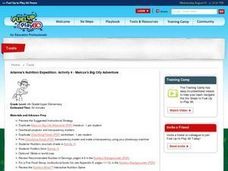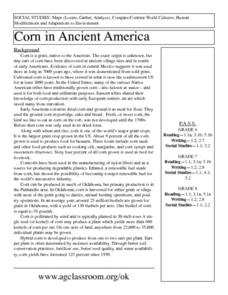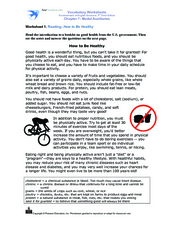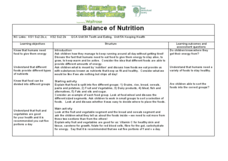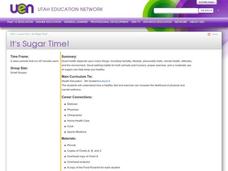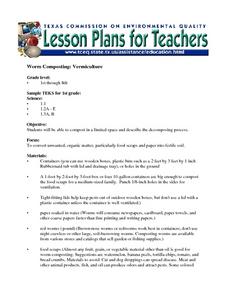Curated OER
Food For Energy - Four Food Groups
Students consider how food is converted to energy. In this science lesson plan, students explore the importance of eating properly with a balanced diet as they study 4 food groups.
Curated OER
Agriculture in Motion
Youngsters learn about simple machines that could be used on a farm. They learn about agricluture, listen to a farmer speak, compare and contrast different farm machines, and then design their own. Note that although the publisher...
Curated OER
Vocabulary Worksheets - Reading: The Food Pyramid
In this vocabulary worksheet, students read a passage about the food pyramid and then answer 8 multiple choice comprehension questions.
Curated OER
Reading: The Food Pyramid
For this reading comprehension worksheet, students read a one page text about the food pyramid. Students then complete 8 sentences with the correct words from 2 choices.
Curated OER
Marcus's Big City Adventure
Fourth graders review their knowledge of nutrition and the 5 food groups. Then they read a story which involves food from Ethiopia, India, and Mexico. They examine these foods and their nutrients, considering the health value of each.
Curated OER
Food Groups
In this food group worksheet, students will focus on vocabulary enhancement. Students will complete 7 multiple choice questions by reading each question and choosing the answer that depicts what is pictured to the left of each question.
Curated OER
Dinner Etiquette
Students in Family and Consumer Sciences classes plan a complete dinner menu that is nutritious and appetizing. They set a table using the correct dishes and utensils, prepare the meal using correct procedures, and serve it using proper...
Curated OER
The First Farmers
Pupils show how constant irrigation, with repeated evaporation of water that left salts in the soil, eventually ruined much farming land in southern Mesopotamia. They discuss the idea that with the development of irrigation people...
Curated OER
Farm Products Help Me Grow
Students view a display of empty food containers (or illustrations). They select a food and decide as a class if it has an animal or plant origin. Students view a display of common farm animals that are commonly eaten (cow, pig, chicken,...
Curated OER
Corn Field Math
Middle schoolers complete problems dealing with whole numbers, fractions and percents. After exploring the history of corn and related farming vocabulary, students work in pairs to solve multi-step problems. They incorporate the use of...
Curated OER
Corn in Ancient America
Students explore the importance of corn to the survival of early civilizations of the Americas. Through research and discussion activities, they read and describe how corn was used as food and currency in early civilizations. They...
Curated OER
Reading: How to Be Healthy
In this reading for information activity, students read a one page text about healthy living practices. Students then answer 8 multiple choice questions about what they have read.
Curated OER
Key to Good Health #1: Nutrition
Students learn tips for healthy eating. In this nutrition lesson, students learn about the four main food groups, view a food pyramid, and get tips on how to get the most nutrition out of their meals. Students also learning about eating...
Curated OER
How Much Nutritional Value Does Rice Really Have?
Fifth graders see the nutritional value of rice. In this healthy eating lesson, 5th graders view the Food Guide Pyramid and the number of servings one is supposed to eat in each food group. They focus on rice and its benefits for the body.
Curated OER
Corn in Legend and Myth
Seventh graders compare myths and legends about corn and use creative abilities to act them out. In this corn legends lesson, 7th graders read background information about corn and its importance. Students work in groups to research...
Curated OER
Commonly Confused Words - Quiz 2
In this confused words activity, students fill in the blanks to sentences by choosing the correct confusing word. Students complete 20 sentences.
Curated OER
Balance of Nutrition
Students explore nutrition by completing a group activity. In this balanced meal lesson, students identify the five food groups and discuss their favorite foods from each group. Students utilize illustrations to fill in a fictional plate...
Curated OER
Food Group Craze
Learners play a game to learn or reinforce prior learning of the food groups within the food guide pryamid.
Curated OER
It's Sugar Time!
Fifth graders examine how good health depends upon many things, including heredity, lifestyle, personality traits, mental health, attitudes, and the environment.
Curated OER
The Five Food Groups
Students explore the five food groups as well as the specific foods found in each of these groups.
Curated OER
Paleo-Indian Traditions
Seventh graders, in groups, name and describe the three traditions of the Paleo-Indian period.
Curated OER
A Well Balanced Meal
Students are given paper plates and pictures of food. They are to glue the foods they would eat that would make a balanced meal.
Curated OER
Worm Composting: Vermiculture
Students set up their own composting bin. They observe and record their findings during a period of time. They describe the decomposing process as well.






